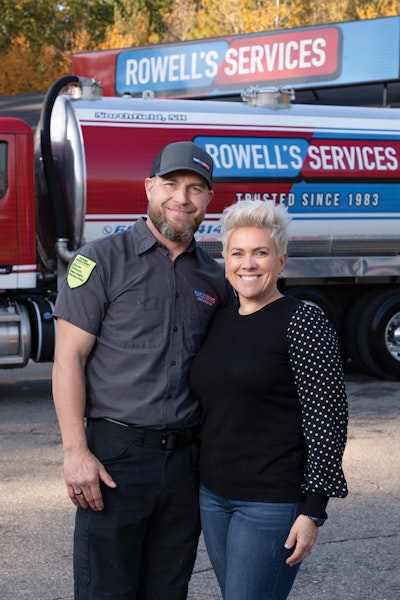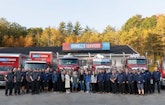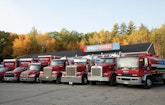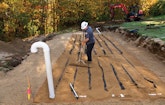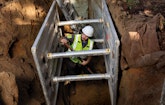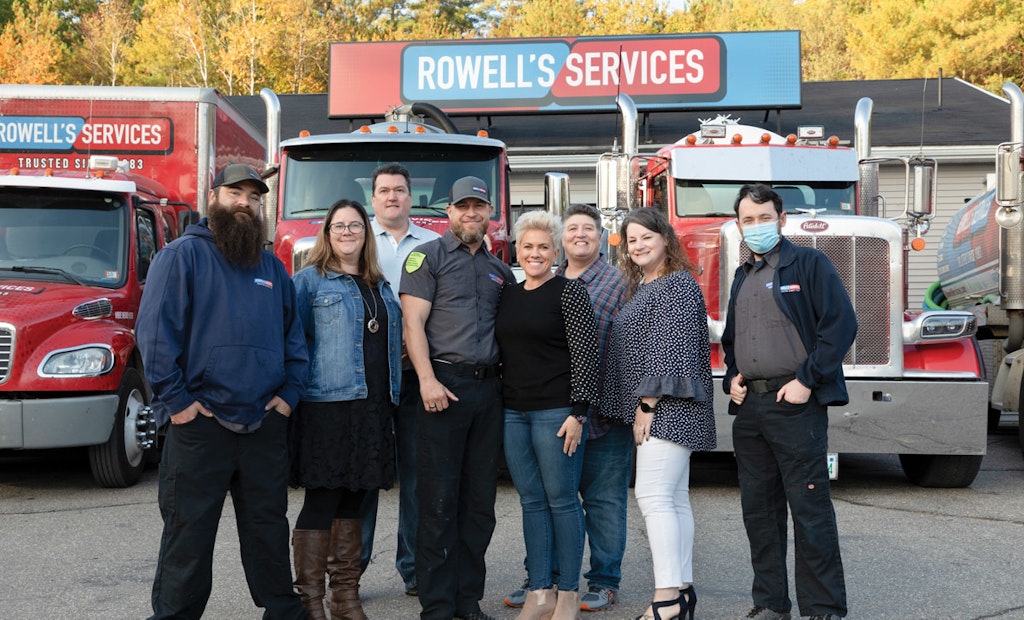
The management group at Rowell’s Services includes, from left, Alex Dion (underground sales & installation manager), Sarah Allaire (administrative manager), Andy Porter (HVAC sales & installation manager), Ian and Mandie Hagan (owners), Marcy Cheney (septic and drain service manager), Jackie Marceau (operations manager), and Will Folsom (HVAC service manager).
When Mandie and Ian Hagan decided to move from Colorado to New Hampshire in 2003 to help her mother run the family business, Rowell’s Sewer & Drain, after a devastating tragedy, it would have been easy for the couple to assume a caretaker role and just keep the business humming along.
But the Hagans, who now co-own the company along with Mandie’s mother, Debbie Rowell, instead went all-in on a pedal-to-the-metal growth strategy. The result is a much different company than the one founded in 1983 by her mother and her father, Dickie Rowell, who unexpectedly died of a heart attack in 2001 while on a hunting trip in Alaska.
In addition to the original core services of pumping septic tanks and cleaning drainlines, the company now installs septic systems; performs HVAC, electrical and plumbing work; does excavating; and expanded into trenchless pipeline rehabilitation by offering pipelining and pipe-bursting technology.
To reflect its new status as a full-service residential contractor, the company — based in the small town of Northfield — was rebranded as Rowell’s Services. Other changes occurred, too. Employment went from 12 to 73. Revenue in 2020 rose to more than $9 million, compared to just below $1 million in 2002. And the company made significant investments in service vehicles and equipment.
SOURCES OF INSPIRATION
The Hagans were inspired not only by the memories of Dickie Rowell and his business legacy, but also by the desire to ensure the company he built from scratch with his wife would not only survive, but thrive.
“I think he’d be very proud of all of us,” Mandie Hagan says, noting her father was a true entrepreneur — a self-taught businessman and inventor. “He had a really good idea for a business and built a great foundation. All we did was just supersize it a bit.”
Another motivating factor is the family’s strong sense of responsibility for employees — a mentality that many owners of family businesses can understand and appreciate. With roughly 75 employees and their spouses and children, Hagan figures about 300 people depend on the success of the company.
“That’s the fuel that drives us every day,” she says.
It also helped that Ian Hagan worked for a plumbing and heating company in Colorado and is very mechanically inclined, she says.
LONG HOURS, HARD WORK
The rapid growth created challenges, especially in terms of developing a leadership team equipped to manage so many new employees, processes and responsibilities, Hagan says.
“It was a lot to swallow early on and it still is today,” she notes. “But we literally just went out and did it. We work nights and weekends — a lot of 90- and 100-hour weeks.
“We just kept adding equipment and vehicles and hiring more people,” she continues. “But our biggest mistake was not putting leaders in place fast enough, which was a tough lesson early on. And we had to make some tough decisions because some people didn’t have the required skill sets we needed to grow the company.”
Joining CEO Warrior, a service-business coaching and consulting firm, played a critical role both in developing the skills of company leaders and boosting the company’s growth trajectory. The coaching the Hagans received gave them skills and strategies that they, in turn, could pass down to employees.
“We had to backtrack a little and share with them everything we’d learned … until someone teaches you something different, you don’t know anything different,” Hagan says.
“Now that our leaders are up to speed, things move faster and easier,” she continues. “Now the pressure is on those leaders to develop future leaders.”
LEVERAGING AN ASSET
After getting the lay of the land, the Hagans decided a logical approach to growth should center on leveraging a valuable built-in asset: the company’s impressive customer base — roughly 13,000 septic and drain-cleaning accounts, she says.
“Ultimately I wanted the ability to provide all the services customers need for their homes,” she explains. “We already had the customer base and we figured if we have the right people and provide great services, it benefits everybody.”
Hagan also was concerned about the cyclical nature of the septic industry, which resulted in a lot of downtime from about January through late April.
“We might get busy with frozen drainlines during cold snaps, but our business was basically seasonal,” she says. “So the question became what do we do with all our manpower during those slower times?
“Offering a more stable range of services helped even out the cyclical highs and lows,” she adds.
Rebranding the business also was essential to the company’s growth arc. Along with changing the company name, the fleet of service vehicles underwent a visual makeover that included a new business logo and a red, white and blue color scheme, she says.
“We needed to improve brand consistency and awareness,” Hagan explains. “We did a market study of the area and decided to go with a color scheme that differentiated our vehicles. Plus my dad loved the American flag, so the colors are a little bit of a salute to him.
“We always try to do things he would approve of,” she adds. “We refer to it as WWDD — what would Dickie do?”
CAREERS, NOT JUST JOBS
The diversity of services is valuable for more than evening out cyclical highs and lows. It also serves as an employee-retention tool by providing opportunities for cross-training, Hagan notes.
“Some of our septic guys are trained to do entry-level HVAC work and some of our pumpers have also become drain cleaners,” she points out. “It gives us the ability to float them to different departments if work in their area slows down.
“It also makes them feel like they’re progressing and learning.” she adds. “It turns a job into a career for technicians, which gives them opportunities to make their lives and their family’s lives better.
“We want people who are excited and motivated and want to grow and learn,” she continues. “And by offering such diverse services, we can offer them more opportunities.”
Hagan says that with overtime and by providing great customer service, some technicians can earn more than $100,000 a year.
“I love that we can provide them with that kind of opportunity,” she says. “I’m not motivated by money. I’m motivated by seeing our company grow and our employees grow and succeed.”
FINANCING OPTION
There’s another piece to the growth puzzle: Offering financing to customers for expensive home repairs, which allows the company to obtain work it otherwise might lose. The company started offering financing about three years ago, she says, and it’s been a valuable addition to the business.
Customers most commonly use financing to pay for big-ticket items such as septic system installations and large HVAC projects.
“Most people don’t have $10,000 or $15,000 sitting around these days in their bank accounts,” she says. “They’re living paycheck to paycheck. So we enable them to use someone else’s money instead of their own.”
Rowell’s uses a credit program offered by Synchrony Bank. One credit plan provides interest-free loans for 18 months and other plans are available with varying payment terms.
“It definitely has helped us grow the business,” Hagan says. “Plus it helps take some of the financial pressure off customers, which is great.”
A FIT FLEET
To pump septic tanks, the business runs eight vacuum trucks; three were built out on Sterling, International and GMC chassis and the rest on Peterbilt chassis. The tanks were made by Progress Tank; they range in size from 2,800 to 5,500 gallons. The trucks feature Masport vacuum pumps.
For septic system installations and excavation work, the company relies on three Kubota machines and International and Kenworth dump trucks.
The company’s roster of drain-cleaning equipment includes six truck-mounted water jetters, along with pipeline inspection cameras manufactured by RIDGID.
For plumbing work, the company owns six box vans from Chevy and GMC.
In addition, the company has invested in a Quik-Shot pipe-lining system made by Quik Lining Systems and sold by Pipe Lining Supply, and pipe-bursting equipment built by TRIC Tools.
Rowell’s Services uses the Service Titan software platform to optimize routes.
BUILDING MOMENTUM
When asked what she envisions down the road for the second-generation business, Hagan says there’s no plan to start tapping on the brakes. Her goal is to triple the company’s revenue in the next three to five years.
“We’re just getting started,” she says. “I feel like we’re a steam engine that’s chugging along and building momentum. We have our leadership team, marketing, equipment, employees and services all in place. The foundation for growth is there and it’s super solid.
“But in the end, it’s all about our people,” she adds. “I can’t tell you how much we appreciate them. There’s no way we’d be where we are without our employees and our culture.”
As Hagan talks about the events that led her to leave her job as an assistant vice president of a bank in Vail, Colorado, nearly 20 years ago, her devotion to her mother and her community is evident. And as she looks back, she says she has no regrets.
“It’s been a real adventure, alternately rewarding, frustrating, difficult and magical — a real roller coaster ride,” she says. “But I wouldn’t have had it any other way.”
